
All that we see or seem is but a dream within a dream.






Edgar Allan Poe, master of shadow and prophet of the unseen, once uttered the haunting words: “All that we see or seem is but a dream within a dream.” With this cry, he laid bare the mystery of existence, that what we call reality may be no firmer than mist, no sturdier than the fleeting visions that pass before closed eyes. To see is not to know, and to seem is not to be. Life itself, with its joys and sorrows, triumphs and defeats, may be nothing more than a layered illusion—a dream folded within another dream, vanishing even as we grasp for it.
The origin of this thought lies in Poe’s own life, a journey steeped in loss and longing. His poetry often wrestled with death, beauty, and the fragile veil between the living and the eternal. In “A Dream Within a Dream,” he speaks not as a mere poet but as a soul tormented by the fleeting nature of love and time. Having seen beloved after beloved torn from him by mortality, he questioned whether anything in this world was truly solid, or whether all human experience was destined to dissolve like sand slipping through desperate fingers. His words echo the philosophies of the ancients, who likewise wondered if life was but a shadow-play upon the walls of a greater reality.
History offers us echoes of this vision. Consider Marcus Aurelius, the Roman emperor and Stoic philosopher. In his Meditations he wrote that life is but smoke, foam, and a dream, reminding himself that the grandeur of empire, the pride of conquest, and the fleeting pleasures of the body pass as swiftly as clouds across the sky. To him, the world was never fully real, for its treasures could vanish in an instant. In this he walked the same path as Poe: recognizing that all we see is fragile, all we seem is impermanent.
Or think upon the story of Guatama Buddha, who, after beholding sickness, age, and death, realized that the world of appearances was but a passing illusion. He named this condition maya, the veil of illusion that traps the soul. In his enlightenment beneath the Bodhi tree, he pierced through the dream and saw the eternal. Poe’s words, though drenched in sorrow rather than serenity, carry the same insight: that human existence, with all its intensity, may itself be nothing more than a dream within a dream.
The deeper meaning is this: if life is but a dream, then its tragedies should not consume us, nor its glories deceive us. The gold we hoard, the power we chase, the fame we seek—all these may vanish upon waking, leaving behind nothing but the shadow of a shadow. Yet within this recognition lies not despair, but freedom. For if all is dream, then what matters most is not possession but presence, not clinging but loving, not conquest but compassion.
The lesson, O children of tomorrow, is to live with open eyes and open hearts. Do not place your hope in what fades, for you will awaken to find it gone. Instead, plant your soul in what endures: kindness, truth, beauty, and love. These may also seem like dreams, yet they are the dreams that awaken others, the dreams that echo beyond the fragile veil of time. If all life is a dream, then live it as a dream worth dreaming—one that carries light into the darkness of others.
Practical wisdom follows: cherish each day as a vision that may dissolve, and each soul you meet as a figure who may vanish with the dawn. Do not waste your waking hours on bitterness or greed, but fill them with acts that will endure even if the world itself is but illusion. Speak words of comfort, create works of beauty, hold those you love with tenderness. For though life may be no more than a dream, it is the only dream we are given, and within it we may still awaken to greatness.
Thus Edgar Allan Poe’s words endure as both lament and revelation: “All that we see or seem is but a dream within a dream.” He reminds us that life is fragile, reality is fleeting, and the heart must learn to walk bravely in a world of shadows. Yet within this dream, we may choose to weave light, so that when we awaken at last, our dream will not have been in vain.






AAdministratorAdministrator
Welcome, honored guests. Please leave a comment, we will respond soon